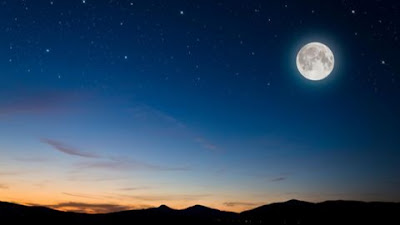Picturesque Strawberry Moon and Midnight Twilight: Exploring the Highlights of June's Night Sky
 |
| © klagyivik / Adobe Stock |
Introduction
The
summer solstice on June 21st brings a spectacular phenomenon for night enthusiasts: a continuous display of colorful
twilight from dusk till dawn. In collaboration with the Hamburg Planetarium,
Dr. Mariana Wagner, an astrophysicist from the Star Theater, unveils the celestial highlights of the month. Discover the fascinating concept of
white nights and witness the enchanting spectacle of the round
strawberry moon.
The Lengthening Days
Daylight Hours
As we approach the summer solstice, the astronomical commencement of summer on June 21st, the
daylight hours grow longer. But what causes this phenomenon? In order for darkness to prevail, the
sun must descend 18 degrees below the horizon. However, in northern Germany, this no longer occurs at the beginning of summer. Instead, a seamless transition from evening to morning twilight takes place. Even during the night, the sun hovers merely 12 to 13 degrees below the horizon in the Hamburg region, creating a captivating
midnight twilight. As the sun remains hidden, a mesmerizing
blue-silvery streak emerges.
White Nights
Further north, in places like
Kiel, Schleswig-Holstein, the descent of the sun is even shallower, reaching just
11 degrees. Consequently, the phenomenon of white nights occurs, intensifying the luminosity. The more northward we venture, the brighter the sky remains. In locations like the Norwegian North Cape, the sun continues to illuminate the northern horizon even at midnight, known as the
midnight sun. Beyond the Arctic Circle lies the "
polar day," where the sun never sets.
The Sun's Zenith and the Length of Day
Simultaneously, the
sun's zenith rises higher at noon. On the day of the summer solstice, precisely at 4:57 p.m., it reaches its peak above the equatorial plane of the Earth. This makes June 21st the longest day of the year, with the sun at its highest point. Subsequently, the dark hours gradually increase. However, true dominance of darkness is achieved only after the
autumnal equinox in September, marking the onset of autumn in the northern hemisphere.
 |
| © Stellarium_Planetarium |
The Strawberry Moon
June's Full Moon
June's full moon is often referred to as the strawberry moon, not due to its color, but rather its association with the strawberry harvest. On the night of June 3rd to 4th, our satellite reaches its full moon position, conveniently coinciding with the weekend. In a pleasantly warm night, we can observe its hourly progression past Antares, the brightest star in the Scorpius constellation. The moon's low position on the horizon enhances the picturesque view, creating a captivating visual spectacle.
 |
| © Stellarium_Planetarium |
Celestial Alignment
The Evening Star and Mars
Adding to the celestial wonders, the evening sky continues to be adorned by the radiant "evening star" Venus. Its radiant brilliance cannot be missed, especially during the summer solstice. On June 21st and 22nd, the slender crescent moon joins Venus, forming a striking triangular alignment with Mars. Although Mars has significantly dimmed since its prominent appearance earlier in the year, this celestial trio creates a captivating sight, with Venus serving as the lower vertex.
Jupiter Takes the Stage
Prepare for a grand celestial performance as Jupiter takes the stage, making its appearance after Venus has already set. Starting from early June at 4:30 a.m. and reaching as late as 2:30 a.m. towards the end of the month, the gas giant becomes the dominant feature in the night sky. On June 14th, around 3 a.m., Jupiter encounters the waning crescent moon, forming a visually striking duo. Whether you're an early riser or a night owl, don't miss this captivating celestial rendezvous.
Conclusion
Experience the mesmerizing interplay of celestial phenomena, from the picturesque Strawberry Moon to the enchanting Midnight Twilight, as you explore the captivating night sky in June.




